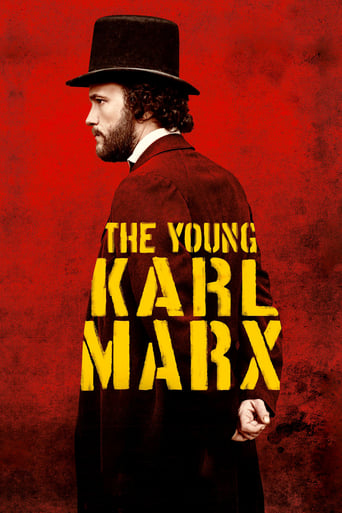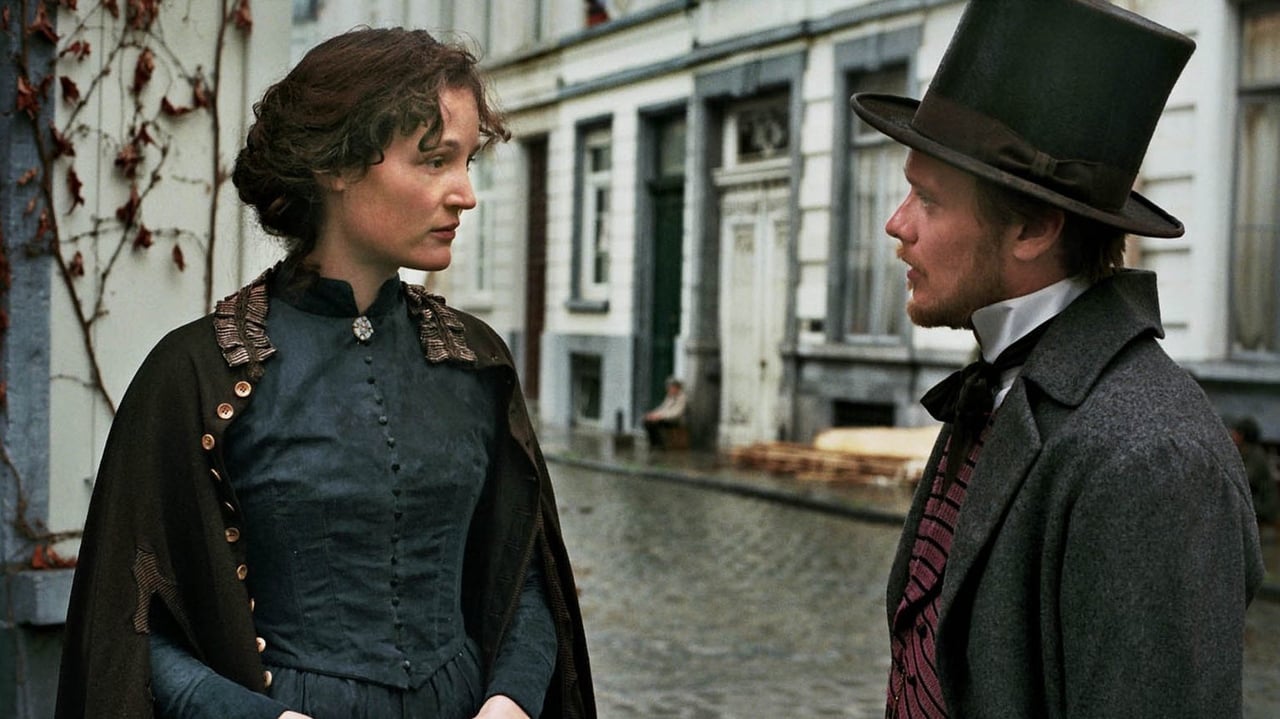jmsdxtr-215-978064
When an honest film like this gets 6.5 stars on IMDB and The Avengers: Infinity Wars get 9.1, it shows that there is something terribly wrong with the ranking system on this site. A thinking film that captures the emotional, social and political complexity of mid-nineteenth industrial European radicalism is something to be truly cherished in this age of the vomit and mind numbing putridity coming from the nightmare factory of popular culture. That's all I need to say. Just watch this film.
sterbrender
But what's with the "young" part, which brings to mind turbulent emotional dramas rather than trenchant economic theory? Whatever else you think about Marx and his ideas, it's hard to imagine him as hot-blooded and young. Watch it if you have time.
eurvater-908-159430
Six years ago I stumbled upon a Charlie Rose interview with author Mary Gabriel, a 2011 National Book Award finalist for her Love and Capital: Karl and Jenny Marx and the Birth of a Revolution. Intrigued, I ordered Gabriel's book. By the time I finished Love and Capital I was, as the British say, "gob smacked." What puzzled and surprised me, as a filmmaker, was that this turbulent epic, utterly engrossing and deeply romantic, had attracted so little attention. Why had this story not made it to the big screen, or materialized into a blockbuster television series? Is the name Karl Marx still so anathema? Then, last Sunday, a new film titled The Young Karl Marx (Le Jeune Karl Marx) which premiered at the 2017 Berlin International Film Festival, suddenly found its way to the Amherst Cinema. In spite of some tepid reviews on Rotten Tomatoes, curiosity lured me to the screening. I have no regrets: The Young Karl Marx (YKM) is a rare and unusual film—beautifully-acted by a stellar cast, craftily scripted, and heavily focused on political content and character. Here is how Peter Bradshaw reviewed it in the Guardian/UK: "Raoul Peck is the Haitian film-maker who has an Oscar nomination this year with his James Baldwin documentary I Am Not Your Negro. Now he comes to Berlin with this sinewy and intensely focused, uncompromisingly cerebral period drama
about the birth of communism in the mid-19th century. It gives you a real sense of what radical politics was about: talk. There is talk, talk and more talk. It should be dull, but it isn't. Somehow the spectacle of fiercely angry people talking about ideas becomes absorbing and even gripping."At the film's center is its title character, played brilliantly by August Diehl. Bradshaw describes Diehl's Marx as "ragged, fierce with indignation and poverty, addicted to cheap cigars, spoiling for an argument and a fight." This is the notoriously nasty side of the Marx persona. But as Gabriel's book, and many other biographies reveal, Marx's character is fascinatingly complex. I have often tried to imagine what Marx must have been like, but been unable to wrap my brain around his multi-sided character. Exploring the complexities of Marx, the man, is perhaps the film's greatest strength. For starters, Marx was viewed by his contemporaries as smart as a whip. Moses Hess, a socialist and early Zionist, provides this over-the- top description to his friends of 24-year old Marx: "
you can look forward to meeting the greatest, perhaps the only real philosopher now living.
He combines a biting wit with deeply serious philosophical thinking. Imagine Rousseau, Voltaire, Holbach, Lessing, Heine and Hegel united in one person, I say united, not lumped together — and you have Dr. Marx." Edmund Wilson described Marx as the greatest satirist since Jonathan Swift. But he was also a pussy cat: Wilhelm Liebknecht, who was constantly in the household during the 1850s, remembered Marx as "the most tender father: one must have seen Marx with his children to obtain a complete notion of the depths of sentiment and the childlike nature of this hero of Wissenschaft (academic pursuit). In his free minutes, or while strolling, he brought them along, played the wildest and most lively games with them— in short he was a child among children. "Children should educate their parents," said Marx, and lived up to the dictum by keeping in step with the reading, entering the fantasy life and adjusting his views to meet the religious scruples of his engaging youngest daughter, Tussy. Marx tells her the story of the Passion —"the carpenter whom the rich men killed," adding that much can be forgiven Christianity because it has taught the adoration of the child. Because YKM dramatizes only a short five year period in Marx's life (1842 to 1847) a great deal of the Marx family saga remains untold: childhood and family life in Trier; Marx's scorching love affair with the baron's daughter, Jenny von Westphalen; the crucial role of his wife and three daughters in aiding and abetting him at every turn; Karl's betrayal of Jenny goes public when Lenchen, the family housekeeper, gives birth to Karl's illegitimate son Freddy, leaving it to Engels to save Marx's bacon by falsely claiming paternity of the boy, thereby rescuing Karl and Jenny's marriage. Perhaps these fascinating omissions will be addressed when the Marx family saga finally becomes a long-running television series--whenever that may come to pass. While we wait, Le Jeune Karl Marx is well worth the price of admission.
Will Jeffery
'A spectre is haunting Europe, the spectre of communism'. These are the opening lines of the Communist Manifesto which ironically is the film's conclusion. We learn that the purpose of the opening paragraph in the manifesto was to be simple and straight to the point, while saying so much. That's what this film is and what it did so well, draw the viewer into a simple world of major importance and complexity. "Substance, but no style!" Is what I heard people say as they left the cinema. Hmm, I'm not sure if I agree...well, fully. Indeed the film had its flaws and yes, it lacked urgency to go read Marxism but what we did get was the man himself and his 'world'. The title using 'young' is realistic; a man most known for the 'birth' of communism is the premise of the film and it was super compelling. This film could have had more style sure, but what is style if there is no substance. Communism has a collaborative process so it was great to see its collaborative side through a fantastic supporting cast ushered by an intelligent screenplay, though the film may be overwhelming for some with its excessive discussion of 'Marxist' philosophy. You never see Marx in a room by himself which ignores an independent or 'hero' image that he may be associated with because he was honestly a family man who liked to chat and have a good laugh. A family man, with the help of his friends, produced the product (The Communist Manifesto) that the film ends with in its final scene and is ultimately what the film is about.



 AD
AD



